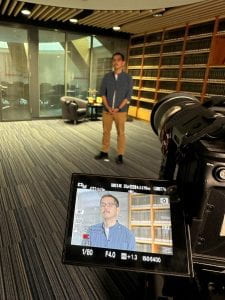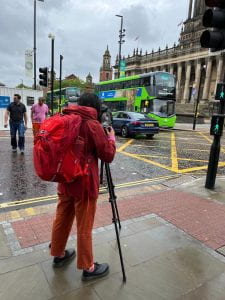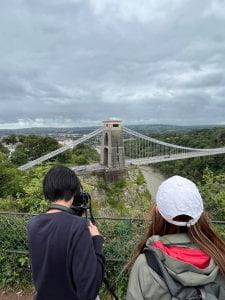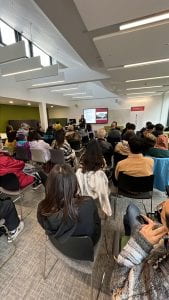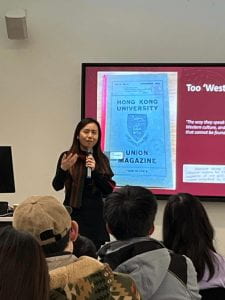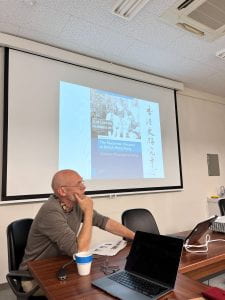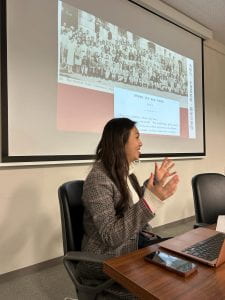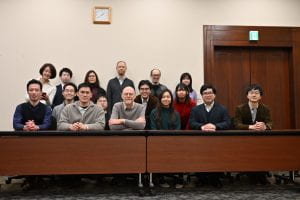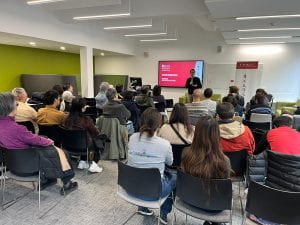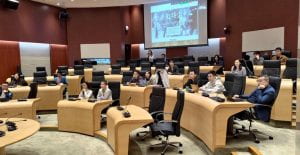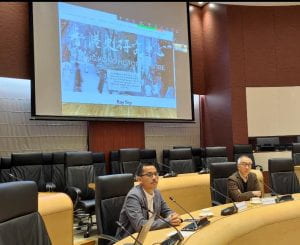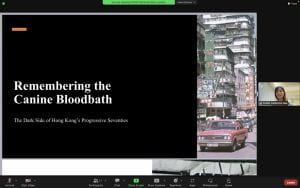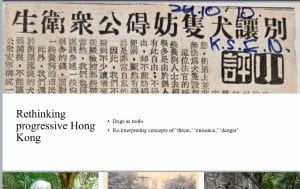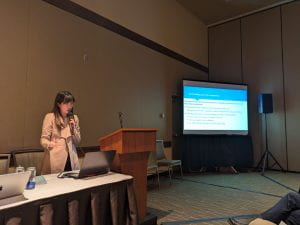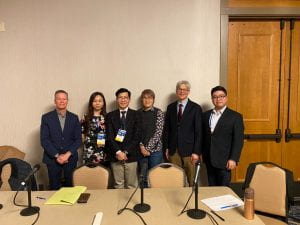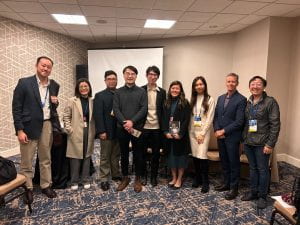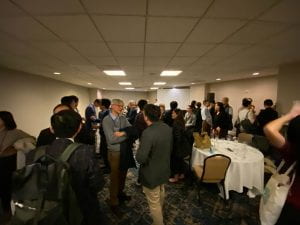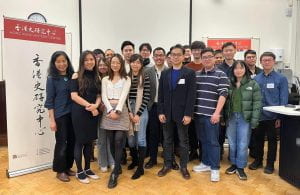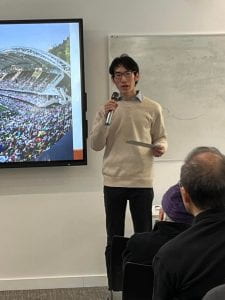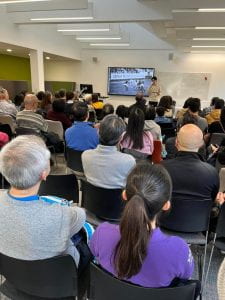Welcome to the Hong Kong History Centre’s quarterly round-up.
This winter the Centre team has been on the move, meeting new audiences, and building its global network of connections, while at the same time, developing its relationship with Bristol’s Hong Kong communities. This is in keeping with our aim to share the work of our established and emerging scholars, and to speak with a diverse range of audiences. We have new publications to report, such as Tom Larkin’s book, The China Firm: American Elites and the Making of Colonial Society, and have been publishing our new video series, a collaboration with the Society for Hong Kong Studies. As I write we are enjoying the company of the first of our visiting scholars, who have come to spend some time with us, and we have launched a call for a second cohort of visitors to join us in the coming academic year.
We now have almost a full team: the latest arrivals are Muriel Yeung, who joins us as a Project Archivist, and Tom Heatley, who joins as Digitization Officer. This completes our team in the University of Bristol’s Special Collections. It’s just as well: even before we have fully set up our Hong Kong Archives Collection, we are receiving offers of material. We’ll tell you more about this in future.
We look forward now to our conference in June, co-organised with the Hong Kong Institute for the Humanities and Social Sciences at the University of Hong Kong. The theme is, fittingly, ‘Journeys’.
****
From 20th January, we have been releasing six episodes of “Hong Kong Documented” on an average bi-weekly schedule. This is a 10-episode series co-produced by Hong Kong History Centre and Society for Hong Kong Studies, which profiles a selection of influential experts and scholars of Hong Kong history inside and outside universities, and at different stages in their careers. From their various positions they adopt different approaches to preserving and promoting knowledge of Hong Kong’s history, covering a wide range of issues: fashion, military, economy, identity, heritage building and Hong Kong representation in Britain etc. Together, they uncover the resilience of the city and enrich our understanding of our past. Six episodes have now been released. You can view them on our Centre’s YouTube Channel.
This January, we commenced our monthly History Salon, featuring different topics on Hong Kong History. We aim to introduce the Bristol based Hong Kong community the research of the Centre and its friends, offer a hub to this community, and the opportunity to reflect and discuss aspects of Hong Kong History.
On 27th January, our Centre’s Co-director Dr. Vivian Kong shared with us the findings of her recently published book, ‘Multiracial Britishness: Global Networks in Hong Kong, 1910-45′ for the first History Salon. She took us to an under-explored site of Britishness – the former British colony of Hong Kong, where all those who were born and naturalised there had access to a British nationality status. Amidst rising nationalism and stark racism in the interwar years, residents of Hong Kong in fact understood Britishness not only as a racial category, but also as a means of social advancement, and a form of cultural and national belonging.
—-
In February we shared our work with colleagues in Japan. On the 20th our Co-directors Robert Bickers and Vivian Kong organised a roundtable at Kyoto University (where Robert has been a Visiting Professor these three months), introducing the Centre, its work and plans, and some of its major research outputs.
On the 22nd-23rd, the team moved to Tokyo and presented on their research at the HK History Symposium at Rikkyo University. It was a fruitful week, and we thank our hosts in Kyoto and Tokyo for the opportunity to showcase and exchange with other HK Studies colleagues in Japan.
On 24th on the Bristol side, our Research Director Prof. Ray Yep gave us a talk on MacLehose and the Independent Commission Against Corruption (ICAC) at the second History Salon. ICAC was created in 1974 after decades of debates and deliberation inside the government. Prof. Ray Yep shared with us his research on questions of why it took so long to be created, how it survived the police mutiny in 1977, and how we might look back at MacLehose’s role and legacy.
Our PhD student Ryan Iu has compiled, with Eric H. C. Chow from HKBU Library, a post on The Digital Orientalist to introduce useful digital platforms for navigating the rich period of early colonial HK History. We have collated the contents that were introduced, you can check this on our Facebook post too.
—-
March was a busy and yet fruitful month. On 6-8th March, Prof. Ray Yep, attended the Annual Conference of Academy of Hong Kong Studies at Education University of Hong Kong. It was a great opportunity to introduce the development of the Centre to friends in Hong Kong and mainland China. He had a very engaging dialogue on the state of Hong Kong studies with Prof. Lui Tai Lok, Director of the Academy as well.
On 7th March, Dr. Catherine S. Chan of Lingnan University, Hong Kong gave us a talk on ‘Remembering the Canine Bloodbath: The Dark Side of Hong Kong’s Progressive Seventies’ for the Speaker’s Series. 1970s’. The MacLehose administration in Hong Kong is usually remembered as a period of optimism, progress, and constructive reinvention. There was, however, a dark side to this narrative of ‘progress.’ The well-publicised ‘HongKong Clean Campaign’ resulted in the irrational mass slaughter of thousands of dogs and the restructuring of human-canine relations. Delving into the anti-dog movement, Catherine uncovered, from a more-than-human perspective, narratives of cruelty that helped underpin Hong Kong’s progressive seventies.
On 14-17th, part of our team headed west to Seattle to attend the Association for Asian Studies Annual Conference. Our student Tracy Leung presented a paper, “Guiding Youth of the Colony”: The Girl Guide Movement and Youth Concerns in Post-War Hong Kong’ at the ‘New Perspectives on State-Society Relations in Late Colonial Hong Kong’ panel on the evening of March 14th. Co-Director Vivian Kong participated in the ‘Teaching Hong Kong History during a Complex Time in Hong Kong History’ roundtable on March 15th.
The team was delighted to see the strong interest in Hong Kong – marked by both the growing number of panels on Hong Kong at the AAS conference, and the great attendance at all Hong Kong panels and the Society for Hong Kong Studies reception. We enjoyed catching up with colleagues in the field, and having many inspiring conversations with our panelists and audiences on researching and teaching Hong Kong history.
On 22nd March, we had our third meeting in Bristol of the Network of Early Career Scholars on Hong Kong History. We had an enjoyable afternoon with Sze Hong Lam (Leiden University) examining the international legal implications of the United Nations General Assembly in Resolution 1514(XV) and 1541(XV), and how they have a lasting impact on Hong Kong’s autonomy even today; Alex Cheung (University of Bristol) on reconstructing the everyday experience of living in Chinese tenements in Hong Kong, and how housing conditions in port cities displaced migrant workers; Phyllis Chan (University of Bristol) examined how officials investigated claims that Hong Kong residents made to British nationality; and Adrian Kwong (University of Oxford) explored how the socialisation experiences of education and work created by Hong Kong’s development challenges the authoritarian stability of Hong Kong, but the high-income and wealthy stratum benefitting from the current political economy supports it. You can find the abstract of the presentation on our website.
On 23rd March, we had our third History Salon on the topic ‘Hong Kong and the Commonwealth, 1949-1997′ by Dr. Tommy Lo of University of Oxford. Hong Kong, as a British colony until 1997, was part of the Commonwealth. Dr Tommy Lo discussed with us the overlooked links between Hong Kong and the Commonwealth world. How did this shape Hong Kong education? Who was sojourning in and migrating between Hong Kong and the Commonwealth? And what did the Commonwealth have to do with the city’s remarkable economic growth? Numerous ties connected Hong Kong history with the world; those with the Commonwealth were unobvious but important.
And of course, there’s more to come. As well as doing, we are planning. We are looking ahead to collaborating on an exhibition that will form part of the 2024 Bristol Photo Festival, developing a new series of history films, and we will soon be putting in place an initiative to showcase how we can provide a secure, accessible long-term home here in Bristol for records of Hong Kong’s history, broadly understood. Please continue to watch this space.
